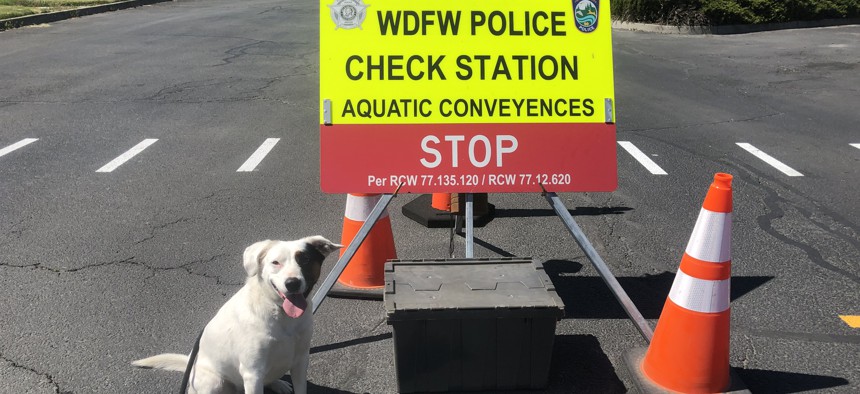Sniff, Sit, Play: Using Dogs to Detect Invasive Species

Puddles inspects boats at official checkpoints, sitting when she smells mussels or their larvae. Washington Department of Fish and Wildlife

Connecting state and local government leaders
Puddles, a 2-year-old Jack Russell mix, is helping Fish and Wildlife officials in Washington state prevent the spread of invasive species of mussels.
The newest employee at the Washington Department of Fish and Wildlife has brown eyes, a sergeant’s badge and a cold, wet nose.
Puddles, a 2-year-old Jack Russell terrier mix, joined the department last month to help fight against zebra and quagga mussels, non-native invasive species that multiply rapidly, clog intake pipes and boat motors and interfere with hydroelectric dams. The mussels have no natural predators, and once they’re introduced to a body of water, they’re nearly impossible to get rid of. They typically spread by attaching to a boat in an infected waterway and then taking root in subsequent lakes and rivers as the boat travels from place to place.
None have been detected in Washington yet. Puddles aims to keep it that way, helping inspect boats being hauled into the state at checkpoints on highways and alerting her handler if she smells the mussels or their microscopic larvae.
“When the larva attaches to a boat, it’s so tiny that we can’t see it with our eyes,” said Staci Lehman, communications manager for the department. “She generally will make two laps around a boat, front to back and then all the way around again. When she smells these mussels, she’ll sit.”
When she detects the invasive species, Puddles is rewarded, either with her favorite toy (if the mussels are visible and can be confirmed by humans), or with praise (if they’re larvae and require lab testing to confirm their presence). Transporting invasive species across state lines can carry severe fines, but Washington state will clean boats for free and let owners go without a penalty, said Sgt. Pam Taylor, statewide aquatic invasive species sergeant and Puddles’ handler.
“We simply don’t want those mussels in our waterways,” she said.

Puddles was trained by California-based training organization Mussel Dogs, which teaches rescue pups to do exactly what Puddles does: detect invasive species that attach to boats, allowing officials to remove them and prevent their spread. She came from a shelter in Fresno, and not much is known about her history, though it’s likely she was too hyper to thrive as a house pet, Taylor said.
“I’m just guessing that she probably tore somebody’s house apart,” Taylor said. “They pick high-energy dogs that basically need a job.”

The department used a grant from the federal Bureau of Reclamation to pay for Puddles, who began inspecting boats in the field with Mussel Dogs at the tender age of 15 months. Taylor traveled to California to train with her for two weeks before the duo returned to Washington to begin their working relationship. The department pays for the dog’s care, and Puddles lives full-time with Taylor.
Thus far, Puddles has inspected just a handful of boats, but she’s likely to get a lot of playtime as a result of her inspections this summer. Last year, officials detected mussels on 18 boats in Washington; this year, they’ve already found six, including one this week.
“Fortunately, those mussels have been dead,” Taylor said. “We’re trying desperately to clean the boats. The primary focus of our check stations are to keep boats clean, drained and dry so that stuff doesn’t get into our state.”
While her detection skills are legitimate, Puddles’ main job is to educate the public about invasive species—and how to prevent their spread.
“What we’re finding is that people in states where we don’t have mussels yet aren’t as passionate about it, and so when they see a boat inspection station, they’re kind of like, ‘Ugh, I have to stop, that’s going to take time out of my day,’” Lehman said. “This makes it more fun. It’s hard to be grumpy when you see a dog. It’s a great way to teach people about mussels and invasive species and things like that.”
And to answer the most pressing question: yes, you’re allowed to pet her.
“We prefer it if you ask first so she’s not trying to check a boat at the same time, but she’s very friendly. She loves people and kids,” Lehman said. “She is a working dog and she is professional when she’s on the job—but she is also a 2-year-old Jack Russell mix, so of course, she loves attention as well.”
Kate Elizabeth Queram is a Staff Correspondent for Route Fifty and is based in Washington, D.C.

NEXT STORY: Public Housing Authorities Reel as HUD Singles Out Immigrants




